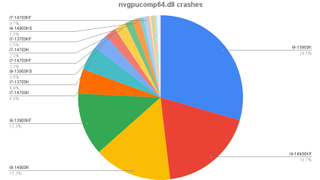Warframe devs report 80% of game crashes happen on Intel's overclockable Core i9 chips — Core i7 K-series CPUs also have high crash rates
Warframe developers provide some crash statistics and describe diagnosing the issue

The water for Intel keeps getting hotter amidst ongoing 13th Gen and 14th Gen CPU crashing issues. On July 9, Warframe developers added to the fire by reporting both Warframe player crash statistics and even a developer who was experiencing the same issue. As noted by the Warframe team, the staff member in question wasn't overclocking and was even using a new PC, but even the most basic in-game tasks resulted in hard crashes.
Surprisingly, stress testing similar machines across the Warframe dev team did not show similar results. But spurred by an Intel report, the Warframe dev team applied a BIOS update to the sole team member who couldn't play the game without crashing, and a BIOS update at least seemed to help. So, there's a non-zero chance that the statistics we've shared below may be reduced by some prudent BIOS updates from 13th and 14th Generation Intel CPU users— but there's likely more to this story, based on what we already know.

While the Warframe development team was able to fix their own in-house Intel crashing issue, this is not the same story being reported by others. Just yesterday, we reported on Alderon Games, developers of Path of Titans, experiencing a 100% crash rate with seemingly any server or development PC using a 13th Gen or 14th Gen Intel CPU. They even noted that the CPUs seem to be deteriorating over time. Thus, they have pivoted their server backend entirely to using AMD systems, deeming Intel's latest desktop socket releases "defective."
These issues aren't exclusive to Warframe or Path of Titans, either. Epic Games has noted that Fortnite, arguably the biggest multiplatform multiplayer game ever, frequently crashes on 13th- and 14th-generation Intel CPUs.
At the time of writing, not even Intel seems to understand what's going on entirely. However, at least one issue (Turbo Boost at unsafe temperatures) can be attested to poor power (and thus thermal) management on Intel CPUs. It is a sensible cause of system stability issues and may even explain the steady deterioration of Intel CPUs reported by Alderon Games. It also seems to make overclocking 13th Gen and 14th Gen Intel CPUs risky, especially if you aren't going "all the way" with liquid cooling.
Hopefully, these issues won't be plaguing Intel users for much longer, and the appropriate updates—and notice to apply those updates—will eventually eliminate this issue from the equation. Ahead of Intel's Arrow Lake launch on desktop later this year, though, this certainly isn't a good look on the part of Team Blue, who shouldn't be getting lazy with that top-dog spot in the market.
Stay On the Cutting Edge: Get the Tom's Hardware Newsletter
Get Tom's Hardware's best news and in-depth reviews, straight to your inbox.

Christopher Harper has been a successful freelance tech writer specializing in PC hardware and gaming since 2015, and ghostwrote for various B2B clients in High School before that. Outside of work, Christopher is best known to friends and rivals as an active competitive player in various eSports (particularly fighting games and arena shooters) and a purveyor of music ranging from Jimi Hendrix to Killer Mike to the Sonic Adventure 2 soundtrack.
-
TerryLaze ReplyAdmin said:Warframe developers sound off on Intel's ongoing 13th Gen and 14th Generation CPU instability issues.
Warframe devs report 80% of game crashes happen on Intel's overclockable Core i9 chips — Core i7 K-series CPUs also have high crash rates : Read moreIt also seems to make overclocking 13th Gen and 14th Gen Intel CPUs risky, especially if you aren't going "all the way" with liquid cooling.
Going "all the way" with liquid is what will make it even riskier since you will be able to push even more watts and amps and volts through the CPU at the same maximum of 100°
If you don't allow your CPU to reach 100° in the first place then going liquid or not will also make no difference to the crashing, it will possibly make a lot of difference in temps. -
Alvar "Miles" Udell ReplyAs noted by the Warframe team, the staff member in question wasn't overclocking and was even using a new PC, but even the most basic in-game tasks resulted in hard crashes.
Curiously, his computer at the office was fine: he was playing with the same loadout, the same customizations, with the same people, but he would only crash at home.
Dollars to donuts his computer at home was using an outdated BIOS in which the "stock" settings were set by the OEMs to be beyond Intel's specifications which resulted in system instability while his office computer was managed by IT and properly updated so that it runs within them. -
A Stoner It is likely far far worse, as chances are the i9 processors are a minority of the total processors while the majority of the problems.Reply -
bit_user This graph is quite fascinating, since it's the first statistics I've seen about the distribution of the failures:Reply
I'd love it, if they provided normalized data, so we knew what proportion of each CPU type was experiencing the issue. If we had that, probably the share of 13th gen CPUs would drop - there should be more of those among their users, since they've been on the market much longer.
However, since the problem seems to develop over time, perhaps it would go the other way, specifically because the 13th Gen CPUs would tend to have more runtime on them. Either way, I'd expect the slices for the Gen 14 CPUs to be occupying more and more of that pie, as time goes on. -
jkhoward Clearly it’s a non-fixable problem or Intel would have fixed it by now. They’re trying to delay the inevitable lawsuit until their new line of CPU launch to draw attention away from the failed line of processors.Reply -
bit_user Reply
I can think of a reason they might not issue a fix for a fixable problem: too much performance cost.jkhoward said:Clearly it’s a non-fixable problem or Intel would have fixed it by now.
It'll be really interesting to see if they issue a fix around the time that Arrow Lake launches. If they issue a performance-robbing fix now, a significant number of people will probably jump ship to AMD, especially with Zen 5 (Ryzen 9000) launching in about 2 weeks. If Intel can string those people along, maybe they'll eventually switch to Arrow Lake.
Yeah, I think a class action lawsuit also might result from a fix that costs too much performance.jkhoward said:They’re trying to delay the inevitable lawsuit until their new line of CPU launch to draw attention away from the failed line of processors.
I gather their Q2 quarterly report is due out, soon. It'll be fascinating to see if they include any sort of guidance about a liability from warranty claims. -
helper800 Reply
I am a bit suspicious of this pie chart because it includes the 14700K and the 14700KF twice. While it is probably some sort of typo, I am not sure what the CPU they would have included would be. All there is left to replace the duplicates are non-K sku CPUs and that would not be consistent with the rest of the chart because they only include K/S sku 1X700, and 1X900 CPUs.bit_user said:This graph is quite fascinating, since it's the first statistics I've seen about the distribution of the failures:
-
TerryLaze Reply
Oh yeah, that 1% difference in performance for multithreaded workloads when going from unlocked 315W to 253W is really going to make the judge throw away the key...bit_user said:I can think of a reason they might not issue a fix for a fixable problem: too much performance cost.
-
bit_user Reply
As there currently is no fix, you have no idea what the impact would be.TerryLaze said:Oh yeah, that 1% difference in performance for multithreaded workloads when going from unlocked 315W to 253W is really going to make the judge throw away the key... -
helper800 Reply
Not to mention that you can experience these issues at any wattage, let alone 300+ or 250+...bit_user said:As there currently is no fix, you have no idea what the impact would be.
Most Popular




